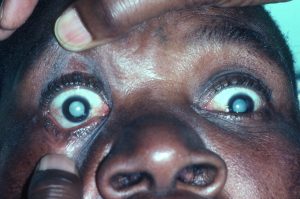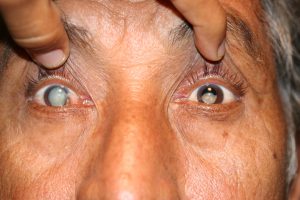Lots happening in global ( international / tropical ) ophthalmology at this time. More interest in efforts to reduce / prevent blindness in the developing world. There are now more physicians / eye health care personnel that have become interested in the efforts of IAPB, Vision 2020, twinning programs, and ophthalmic NGO’s everywhere, etc.. Certainly more courses / symposiums at the Academy concerning the way forward in the reduction of world blindness.
There are many people ( ophthalmologists ) who for decades have been “ waging war against blindness” throughout the developing world. A few North American ophthalmologists ( and more Europeans ) have given their life work to the improvement of the ophthalmic situation in the developing world. We do not have to re-invent the wheel — what works overseas, what is appropriate, what is sustainable, what can be done to strengthen ( not weaken ) the local ophthalmic infrastructure, how do we reduce the brain drain, how to prevent repeating previous mistakes, etc.. Ophthalmic human resource growth and infrastructure development have made incredible advances over the last 30 years. Much good work has been accomplished over the last 3 – 4 decades and much needs to still happen in the new decade( s ). There are many local ophthalmologists / eye health providers that are now taking the lead in eye care in their home countries / regions. Good. With all the chaos coming out of Washington, with the increasing concerns about the effects of climate change secondary to man, it is easy to forget/ discount the tremendous efforts / accomplishments that have occurred over the last 30 years regarding eye care in the developing world. Do you think climate change is having a negative impact on our global eye efforts?
If you have a real interest in Global Ophthalmology then I would encourage you to attend the WOC meeting in Cape Town in June 2020, especially the IAPB meeting in Singapore in October 2020, and the Academy annual meetings ( Global Forum / SEE, Seva, IEF, HCP, Orbis receptions, etc. ). 2020 is a special year for our ongoing efforts to reduce blindness. How can we get the best impact for our efforts — the best bang for our limited health ( eye ) care bucks.
With the beginning of a new decade, I would like briefly to mention some deceased ophthalmic ( global ophthalmologists ) greats who I have fortunately known ( met ) and who have over many years helped to move the goal forward — Fred Hollows, Barry Jones, Jim Standerfer, David Apple, John Cheatham, Joe Taylor, Marilyn Scudder, and many others. Many unsung ophthalmologists have worked tirelessly for decades to reduce blindness in low-income/ middle-income countries. Of course there are many still in the fight — still pushing to reduce blindness among the poor in emerging countries. A good example would be Marilyn Miller MD who this year ( 2019 ) received the AAO Laureate Award to a standing ovation, and Larry Schwab MD who next year ( 2020 ) will receive the International Blindness Prevention Award. Congratulations to you both.
It will be interesting to attend the 2020 IAPB meeting and for all of us to help plot a way forward for the new decade. How can we work together to reduce / prevent blindness? As Barry Jones once said, there are enough poor blind patients in the world for all of us to service. Of course, as we all know, if you want to reduce blindness, then just reduce poverty and give all the girls at least six years of formal education. Now that’s an intervention worth pursuing.
I would like to suggest that complicated eye patients in developing world countries not be referred somewhere for further eye care / consultation when there is really no realistic treatment / intervention possible for that patient and his / her disease process. “ Things “ often do not work in low-income countries / cultures as in industrialized countries. Better for the family to spend their money on school tuition / uniforms / food rather than sending grandmother to the capital or out of the country for further medical evaluation ( $$$ ). Most of my patients in Belize, have a “bad experience” trucking off to Mexico or Guatemala for further eye care/ evaluation. Easy to unload the patient / health problem by referring away but what really is best for the patient and that family unit ?
I have written on this previously but would suggest you not carry used / rehab glasses from the States. Most patients in developing world countries simply do not want used glasses even if they might see better. Reading glasses are often well received but usually not other glasses. They eventually get tossed out. Also many patients who could actually see better with glasses simply will not wear them. This is true in many countries / cultures. Unfortunately we will not prevent / cure low vision by giving everyone a pair of glasses


Western medical mentality is often not correct for emerging – world countries. It took me a couple of years of living and working in Tanzania to understand partially that concept. I’m still learning. Let me give you an example before I close. The attached photos show one patient with bilateral dense cataracts. So operate on either eye ( cataract ), correct? But how about the other patient with dense cataracts OU but a subluxated lens OS? The history could be useful. OK, so which eye ( cataract ) do you operate on first? In the States you could certainly make the case for operating on the left eye ( don’t forget the IV mannitol ), see what vision post-op you achieve and do the right ( good eye ) eye at another time. That would be reasonable for most of us in the States. But what if this is the only chance for this patient to gain useful vision? One chance and the patient will never see another eye surgeon. Often tremendous efforts / cost for the family to show up at your eye center / O.R.. One chance. So which eye do you now want to operate on? In the developing world operate on the right eye. You want to operate on winners. Blind before surgery and perhaps blind after surgery is not good for the patient, the family, or the ophthalmic P.R. for that community.
I wish you all a happy / useful 2020. Get involved. Be here now.
Keep The Faith,
Baxter McLendon MD
803-632-1699 Home
803-591-8332 Cell

